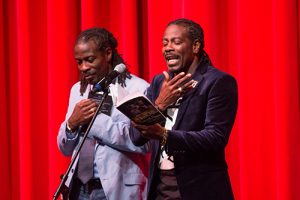
SELBYVILLE — The Joshua M. Freeman Foundation recently concluded its latest arts in education initiative, a poetry program, at five Sussex County high schools.
The initiative — which featured a presentation by Delaware’s Poets Laureate, The Twin Poets, and a voice and movement workshop by the Brown Box Theatre Project — was a two-week program at Woodbridge, Milford, Indian River, Seaford and Laurel high schools.
The program not only embodied the mission of the Joshua M. Freeman Foundation, which is “partnering to present memorable performances and provide inspired arts education for all,” but also exposed Sussex County students to rich arts experiences that aligned with their curriculum.
The Twin Poets, Nnamdi Chukwuocha and Albert Mills, won many awards for their community work in Delaware and were also featured on the HBO program, “Def Poetry,” before they were appointed by Gov. Jack Markell in 2015 as the Poets Laureate, which is an honorary position.
As the Poets Laureate, the Twin Poets have been strong advocates for poetry throughout the state by incorporating poetry/spoken word and creative writing programs into schools, libraries and community centers, according to the state’s Division of the Arts website.
Among the poems Chukwuocha and Mills presented at the schools, was “Dreams are Not Illegal,” which they performed on “Def Poetry.”
This poem was also the piece Brown Box incorporated into its voice and movement workshop.
In the workshops, students learned new ways of using their voice as a tool and discovered how body language can reveal their intentions to an audience.
These lessons are important for students because it shows them different ways to explore their thoughts, ideas and identities, said Talia Curtin, marketing director for Brown Box.
“In an era when STEM (and other things) are definitely a priority (in schools) it is really important for students to be experiencing things on their feet,” said Kyler Taustin, artistic director for Brown Box. “Whether it’s actually expressing themselves, or just getting comfortable with the idea of using their voice and using their bodies as a means of expression.”
According to Taustin, the workshops were a great success.
“No matter how active students may seem to be or how engaged they may seem to be, the fact of the matter is, they are standing up, they are being forced out of their comfort zone,” he said, adding the goal is for students to understand there are other ways to present and express themselves. “And hopefully, with the help of the teachers who are seeing it and the curriculum, as it stands, these things can join hand-in-hand and really, ultimately grow into something that is tools for these students (to use) both in school and out of school.”
One teacher who will call on her students to use the tools they learned in the workshop is Indian River High School English teacher Sadie Andros. For Andros, the poetry program was important for her students because “without the ability to write … to create, you lose a part of expressing yourself and your voice,” she said.
